June 1, 2025 | 02:38 GMT +7
June 1, 2025 | 02:38 GMT +7
Hotline: 0913.378.918
June 1, 2025 | 02:38 GMT +7
Hotline: 0913.378.918
According to the Dak Lak Department of Agriculture and Rural Development, the province currently has about 1,140 hectares of cocoa; productivity reaches about 1.556 tons/ha; and the average output reaches about 1,525 tons/year. Cocoa trees are now grown in districts such as Ea Kar, Ea Sup, Krong Ana, and Ea H'leo.
Cocoa trees grow and develop well on old, stunted, disease-infected coffee-growing lands that must be liquidated and cannot be replanted. Besides, this is a shade-loving tree suitable for intercropping with fruit trees, long-term industrial trees, or forestry trees. This type of tree does not also compete much with other crops, contributing to increasing income per unit of area. Experts assess that Dak Lak's cocoa has the best quality in the country because the locality has suitable soil and climate conditions for this plant to grow and develop.
Mrs. La Thi Thuy Linh's family (living in Ea Knop commune, Ea Kar district) grows nearly 1 hectare of cocoa that is being harvested with a dry bean yield of 2.5 tons/year.
According to Mrs. Linh, the price of cocoa in previous years ranged from VND 80,000 to 90,000/kg, but this year it doubled to VND 150,000–180,000/kg. After deducting expenses, Mrs. Linh's family earned a profit of about VND 250 million.
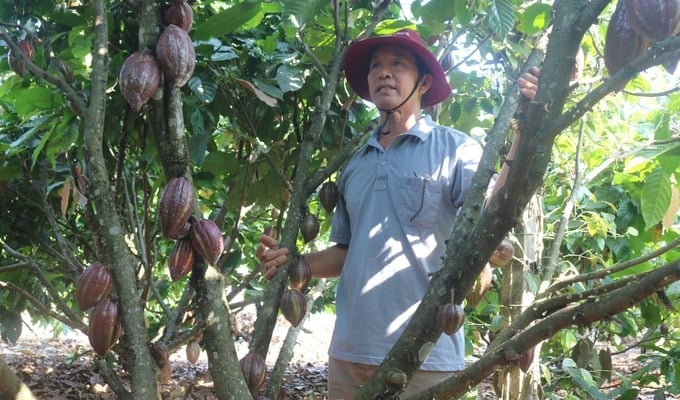
Dak Lak currently has about 1,140 hectares of cocoa; productivity reaches about 1.556 tons/ha; and the average output reaches about 1,525 tons/year. Photo: Quang Yen.
Similarly, Mr. Vo Van Sy's family (Ea Na commune, Krong Ana district) also converted an old and stunted coffee garden to grow about 1 hectare of cocoa.
This year, due to prolonged dry weather and increased pests, cocoa productivity decreased by nearly 50% compared to 2023. It is estimated that Mr. Sy's family harvested approximately 1 ton of dry cocoa beans. At the selling price of VND 150,000/kg, the family makes a profit of about VND 135 million.
"Productivity has decreased, but the price has increased highly, so my family still makes a good profit. Growing cocoa brings much higher income than coffee but requires less care and investment," Mr. Sy shared.
Currently, the entire Ea Na commune has over 60 hectares of cocoa, with an output of nearly 100 tons of dry beans/year (productivity of 1.5 tons/ha). In addition to the local advantage of having suitable soil conditions for growing cocoa, most cocoa growers in the commune now participate in cooperatives, linking with businesses to receive technical support. Thereby, helping their cultivation achieve high productivity and quality, as well as stabilize output and prices.
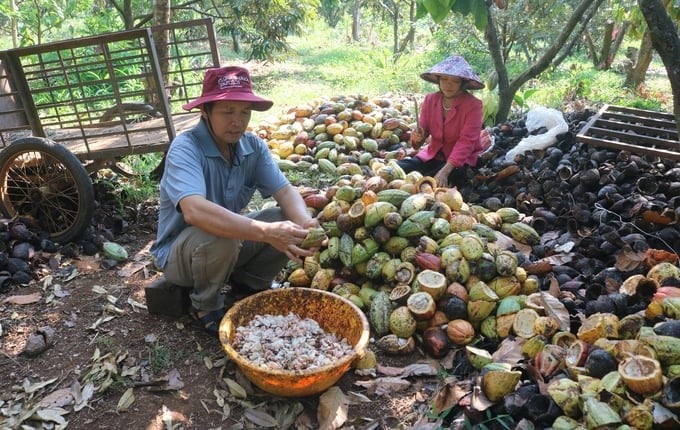
This year's cocoa price increased highly, so farmers in Dak Lak made big profits. Photo: Quang Yen.
Mr. Thai Dang Dam, Chairman of the Board of Directors and Director of the Ea Kar Cocoa Agricultural Cooperative, said that the Cooperative currently has 65 members and links with 179 households to grow cocoa on an area of more than 300 hectares in six communes and towns. The current Cooperative's products include cocoa powder, cocoa butter, chocolate, and cocoa wine, of which 2 have achieved 3-star OCOP and 2 have achieved 4-star OCOP.
According to Mr. Dam, in recent years, thanks to the attention of the functional agency, the Cooperative has been supported with capital, machinery, and traceability, so machinery and equipment are relatively complete.
"In the coming time, with stable prices and output, each year the Cooperative will develop an additional 10–15 hectares of cocoa. In order for cocoa to achieve high productivity and good quality, the Cooperative will choose standard varieties for sustainable cultivation and expand raw material areas. In addition to the production advantages, in general, the cocoa consumption market is favorable. It is forecast that in the future, supply will still be lower than demand," said Mr. Dam.
To find output for cocoa beans and cocoa products, cooperatives have linked with some chocolate production businesses to purchase cocoa beans, helping farmers feel secure about their output.
Besides, cooperatives are encouraging people to switch to organic cocoa production to stabilize productivity and quality and meet the increasingly high demands of the market.
Currently, in Dak Lak province, there are 6 businesses purchasing cocoa for export, with more than 20 purchasing agents in the districts.
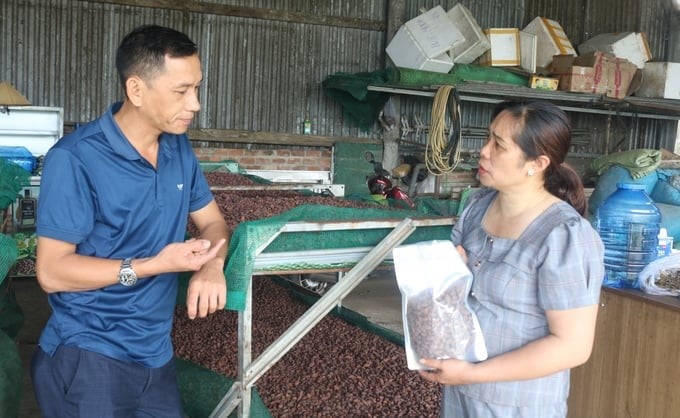
To stabilize output, cooperatives are linking with businesses to build a value chain for cocoa. Photo: Quang Yen.
Besides, businesses such as Cao Nguyen Xanh JSC and Nam Truong Son Cocoa Co., Ltd. also participate in purchasing cocoa. The province's fermented cocoa beans are evaluated by domestic and foreign businesses as having good quality and are favored by the market because of their large bean size.
Mr. Truong Ngoc Quang, Director of Nam Truong Son Cocoa Co., Ltd., said that this year's cocoa price increased beyond the business's forecast. When cocoa prices increase, people benefit and increase their income, thereby paying more attention to investing, caring for, and expanding the area, contributing to increasing output and aiming for sustainable development.
"The company is linking with two cooperatives with an area of about 250 hectares in Krong Ana, Ea Kar, and Buon Don districts. The output reaches 200–250 tons/year. Since 2013, the company has supported people and cooperatives to build raw material areas and provided training to build a linkage chain. Our goal is to strengthen the linkage chain to develop cocoa trees sustainably and support farmers in production and fermentation techniques to ensure product quality," said Mr. Quang.
With the potential and advantages of growing and developing cocoa, Dak Lak province is building a project to develop the cocoa industry in accordance with the direction of agricultural restructuring in the coming period.
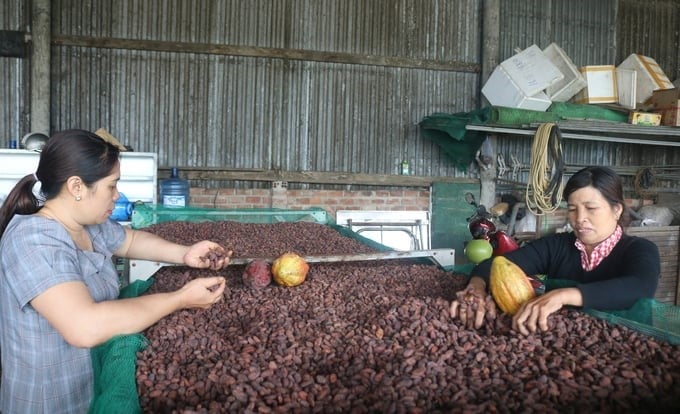
Dak Lak is building a project to develop the cocoa industry. Photo: Quang Yen.
Accordingly, the project's goal is to build a cocoa industry that develops along the value chain, ensuring economic, social, and environmental sustainability; build product brands in accordance with international integration, meeting the increasingly high demand for cocoa consumption in export and domestic markets.
On the other hand, many farmers, cooperatives, and businesses in the province are also testing and implementing a model of both cocoa production and experiential tourism.
According to the Dak Lak Sub-Department of Crop Production and Plant Protection, the province's key cocoa-growing areas have currently built a production and consumption linkage chain, contributing to increasing the value of cocoa trees and bringing people a stable source of income at VND 100–130 million/ha/year.
To develop the cocoa industry, the locality is reviewing areas capable of growing cocoa trees and, at the same time, reviewing the cocoa industry from production and processing to consumption markets and policy mechanisms to develop a sustainable industry.
In the project to develop the cocoa industry, experts offer many solutions, but the most important stage is choosing varieties, and at the same time, the processing and pest prevention stages need to be implemented well.
Dak Lak province also determined that developing the cocoa industry must focus on farmer households and other economic sectors, so there needs to be specific policies to encourage the development of the household economy, the farm economy, and private economic sectors so that they all have the conditions to participate in cocoa development.
Translated by Thu Huyen
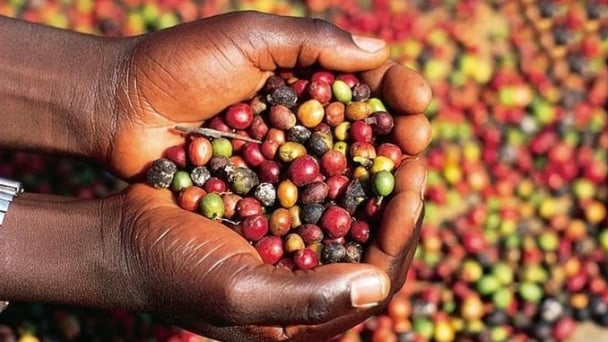
(VAN) Coffee prices on May 29, 2025, are fluctuating. The domestic coffee market declined, dropping by VND 2,200, trading at VND 119,700 – VND 120,000/kg.
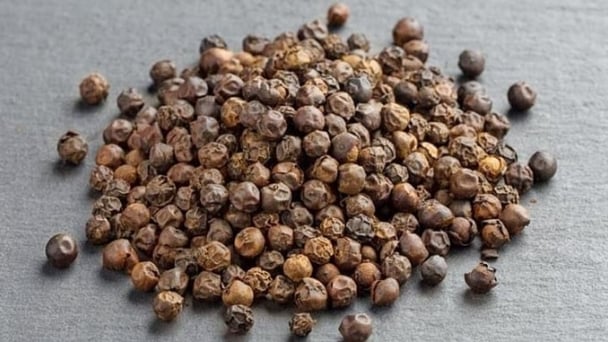
(VAN) Pepper prices on May 29, 2025 declined sharply. Domestic pepper prices in Vietnam remain stable, Trading at VND 147,000 to VND 148,000/kg.
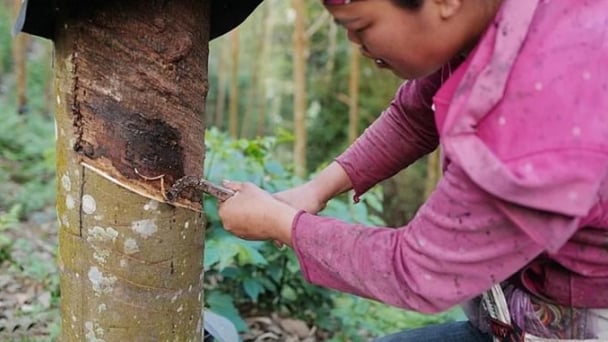
(VAN) Rubber prices on May 28, 2025 are maintaining an upward trend. Domestic latex prices remain stable, trading in the range of VND 397 to VND 462/TSC.
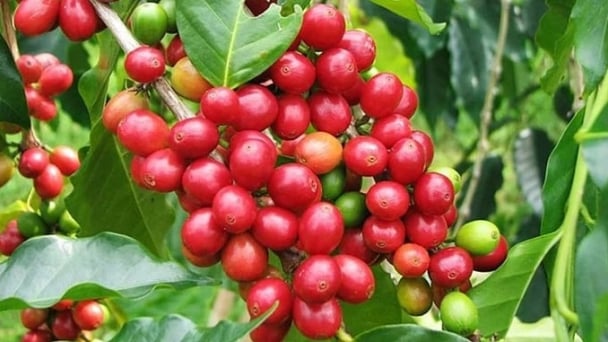
(VAN) Coffee prices on May 28, 2025, show mixed movements. Domestically, prices dropped sharply by VND 1,600, trading at VND 121,700 – VND 122,200/kg.
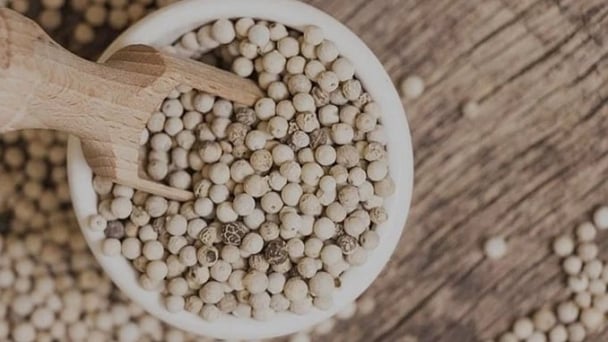
(VAN) Pepper prices on May 28, 2025, remained unchanged globally. Domestic pepper prices have increased by VND 1,500, trading at VND 147,000 – VND 148,000/kg.
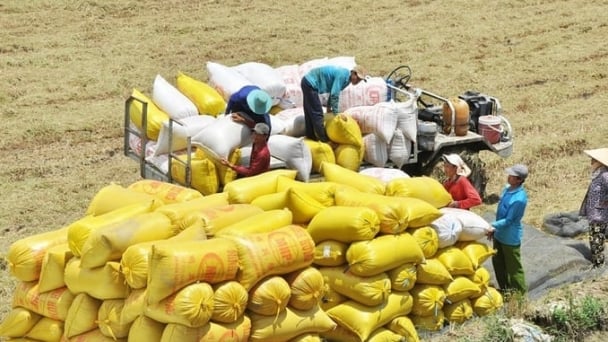
(VAN) Rice prices on May 27, 2025, show no new changes for both paddy and milled rice. Meanwhile, Vietnam’s export rice prices continue to remain flat.
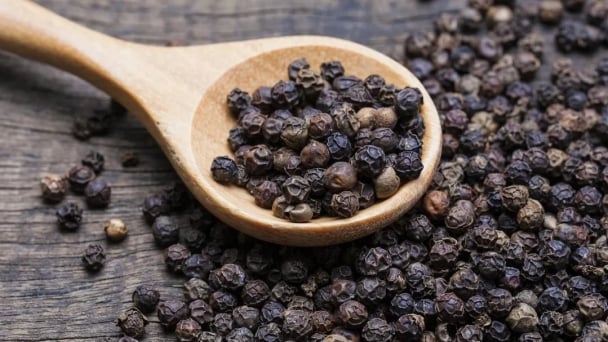
(VAN) Pepper prices on May 27, 2025, recorded a slight increase in Indonesia, while domestic prices remain stable, trading at VND 146,000 to VND 147,000/kg.